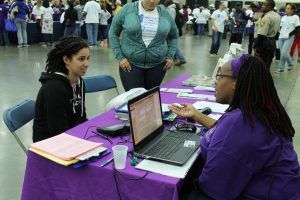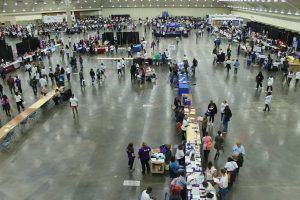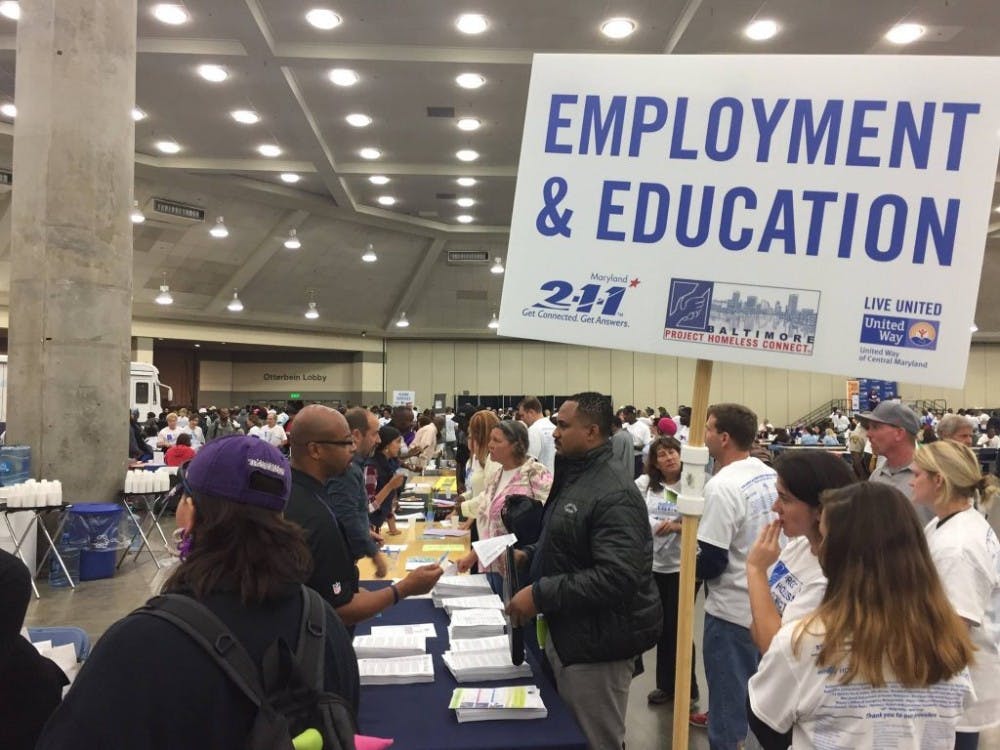Julia Mitchner, class of 1981, was one of the 2,000 volunteers at Project Homeless Connect, which provides free services to the homeless.
Joined by several members of her church, Morning Star Baptist, in Catonsville, Md., Mitchner worked at the event’s foot-washing station.
“It’s something that Jesus did, and we’re following in his footsteps. He washed feet for his disciples, and that’s what we’re doing here,” she said.
The fifth annual Project Homeless Connect, organized by the non-profit United Way of Central Maryland (UWCM), hosted about 100 service organizations that assist the homeless or near-homeless in Baltimore.
Volunteers at the event last Friday, Sept. 30 in the Baltimore Convention Center included both professionals who do not normally work with the homeless and those whose careers are dedicated to service work. Mental health specialists, security personnel and translators for Spanish-speaking participants also attended.
Before the doors opened at 9 a.m., a line of participants had already stretched out of the convention center onto Pratt Street. In an announcement at the door-opening ceremony, President of UWCM Mark Furst spoke about the impact this event would have on both volunteers and participants.
“What they appreciate the most is that someone they never met treats them with dignity and walks with them side by side to every station. Don’t be surprised that the life you change the most may be your own,” he said.
Mitchner said that her community service was humbling. She praised the event for allowing her to give back to others, and she especially enjoyed seeing people’s faces after washing their feet.
“I think this is an awesome event. I really do. It is an opportunity for people experiencing homelessness to get almost every single service that they need, whether it’s special housing, teeth done, and all of this is at no cost,” she said. “This is unbelievable. I wish they could do it twice a year at least. It’s just one day, but it’s an awesome day.”

While the majority of the stands set up on Friday morning, vital services in high-demand such as dental and vision care were availablestarting from Thursday at 5 a.m.
“You remember that this was done on one day in the past. But we were overwhelmed with demand for dental services, so yesterday and today, we are each day serving 350 dental patients,” Furst said. “Last year, all we could do was extractions, but today we’re doing oral surgery, fillings, panoramic X-rays and the full range of dental services.”
General dentist Tom Ritter led the dental care efforts. Individual needs were first assessed, and others were given a physical checkup and a printed x-ray to carry away with them. Many participants requested tooth extractions, the most common procedure performed. If possible, dental experts updated electronic medical records.
“Poverty causes many dental problems. Most people have tooth pain—constant tooth pain,” Ritter said.
The dentists who volunteered their services limited themselves to one procedure, with possible exceptions for multiple tooth extractions. They were assisted by hygienists and students from the University of Maryland School of Dentistry.
“It’s pretty nice,” said Zelda Outlaw, a participant who had never gotten dental work before. “I came down here from the Recovery Network, the drug addiction program that I’m in. My counselor referred me. They’re all meeting me down here.”
John Houten of Edgewood, Md. participated in Project Homeless Connect for the first time this year where he received an x-ray photo and cleaning.
“This is helpful,” he said. “I try to get to the dentist twice a year.”
The vision center also expanded its capabilities to help people with vision problems. Last year, the organizers spent days tracking down individuals after the event to give people their prescription glasses, but this year, they cut and framed glasses on site—at no cost to the participant.
Representatives from government offices also offered a variety of resources from nutrition to legal advice.
Deputy Director of the Mediation Unit of the Baltimore District Attorney’s Office Alisa Bralove explained that her unit helped resolve consumer issues such as landlord-tenant and automotive service disputes and warned people vulnerable to scams and identity theft.
According to Bralove, a big need from her office was with filing requests for expungements, or erasing items from criminal records to help people find jobs or housing.

Many housing advocates were present at Project Homeless to let participants know about housing assistance. A program managed by the U.S. Department of Housing and Urban Development and the VA called HUD-VASH gave rental assistance to veterans experiencing homelessness while also assisting them with mental health and substance abuse, if needed.
Natalie Daniels, an intake supervisor with the Mosica-Alliance Veterans Team, worked with veterans facing homelessness to secure their veterans benefits which they might not always be aware of.
“Not every veteran is eligible for the same things, from education, housing, medical and dental benefits. Certain vouchers are allocated for veterans,” she said. “I am a veteran also, I love it when I have the opportunity to come out and help other veterans.”
The Baltimore City Sheriff, which also provided security for the event, also had a table where they let participants know about protective orders, which prevents acts of domestic violence. Domestic violence can be a cause of homelessness, especially for women and childrenß, but the offenders are only forced out of the house when the sheriff acts on them. According to Major Sabrina Harper, over 2,000 protective orders have been issued in Baltimore this year and the department has served about half of those orders.
The Baltimore City Sheriff also executes and tracks eviction orders in Baltimore and shares information with other agencies such as the Department of Social Services to prevent homelessness due to eviction.
“For every person who’s scheduled to be evicted, we send them a resource information sheet that we developed to who they can call to get services for them to prevent eviction,” Assistant Sheriff Sam Cogen said. “Some of the main service providers [at this event] are provided on this sheet, and every person facing eviction gets a sheet.”
The Hopkins community service group Circle K also participated in the event.
Vice Service Chair of Circle K Barry Huang praised the extensive services provided and the management of the event.
“For me, it really felt great to be able to help out and contribute to such an amazing cause, because some of the clients may not otherwise be able to access these services, especially not all in one place,” Huang wrote in an email to The News-Letter. “One might think it would be really hectic to have all the services all in one place, but it was organized extremely well and with the help of a map, volunteers were able to escort their participants very smoothly to all the services they needed.”
Huang also spoke about the importance and value of going out to reach out to the greater Baltimore community.
“I think it’s important that Hopkins students go out and serve their community through events like these because not only are you able to help your fellow man, but it also expands your worldview and makes you realize that there is a whole other really exciting world out there beyond the confines of the Hopkins campus,” he wrote. “I think it’s very valuable to interact with and connect with people that are not other college students or your professors.”





